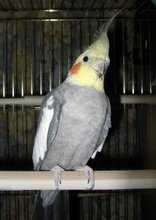Becoming more and more popular as a pet, the chinchilla, with its timid and gentle nature, big black eyes, large round ears, long whiskers, long bushy tail and the finest and densest fur of any animal in the World is often described as the nearest thing to a real life cuddly toy. Chinchillas make ideal pets, they are very clean, rarely bite unless frightened and with a little effort and patience are easy to tame. They are also hardy and quite simple to care for provided a few basic rules are followed, the most important of which is correct diet. In the wild chinchillas are ground dwelling animals living in crevices in rocks and belong to the group of animals known as ‘rock hoppers’.
They are nocturnal by nature dozing during the day and becoming more active and feeding in the evenings, being nocturnal makes them quite a good pet for someone who is out at school or work during the day as they enjoy the peace and quiet during the day to doze and enjoy their exercise period in the evenings. Being nocturnal they can be quite active and noisy during the night so may not be the ideal pet for the bedroom!
The best location for their cage would be a cooler part of the house away from direct sunshine and radiators.
The chinchilla has the finest fur of any animal in the World, isn’t it strange it should be closely related to the porcupine!
How is the chinchillas fur different from other animal? Animal hair grows from tiny follicles (holes) in the skin, each follicle usually growing one hair, but with chinchillas, they have approximately the same number of follicles, but each hair splits into 50-90 hairs giving the chinchilla its beautiful, fine silky, dense fur and because the fur is so fine and dense no parasites (fleas or lice) can live in it.
Responsibilities attached to chinchilla ownership;
Fresh pellets( not a mix!), hay and water need to be supplied daily
A daily dustbath is essential to keep their fur in good condition.
Chinchillas are very intelligent and inquisitive, they get attached to their owners so you should be prepared to spend a little time with them every day.
They are very clean animals with little odour but need to be cleaned out regularly.
Chinchillas are rodents with continuously growing teeth, it is in their nature to spend much of their time gnawing, a continuous supply of correct materials should be supplied for this purpose.
Treats and titbits should be fed sparingly, their digestive system has evolved to deal with a very basic diet, rich foods can cause problems.
Chinchillas enjoy raisins and if used in moderation, two or three a day, do not seem to cause any problems.
Another unusual factor with chinchillas is their long life span, the average being ten to twelve years the documented record being twenty two years.
For further information visit our website at
Paul Spooner Chinchillas, Cages & Accessories
Paul Spooner has been a breeder and judge of chinchillas for almost 20 years
Article Source: http://EzineArticles.com/?expert=Paul_Spooner




